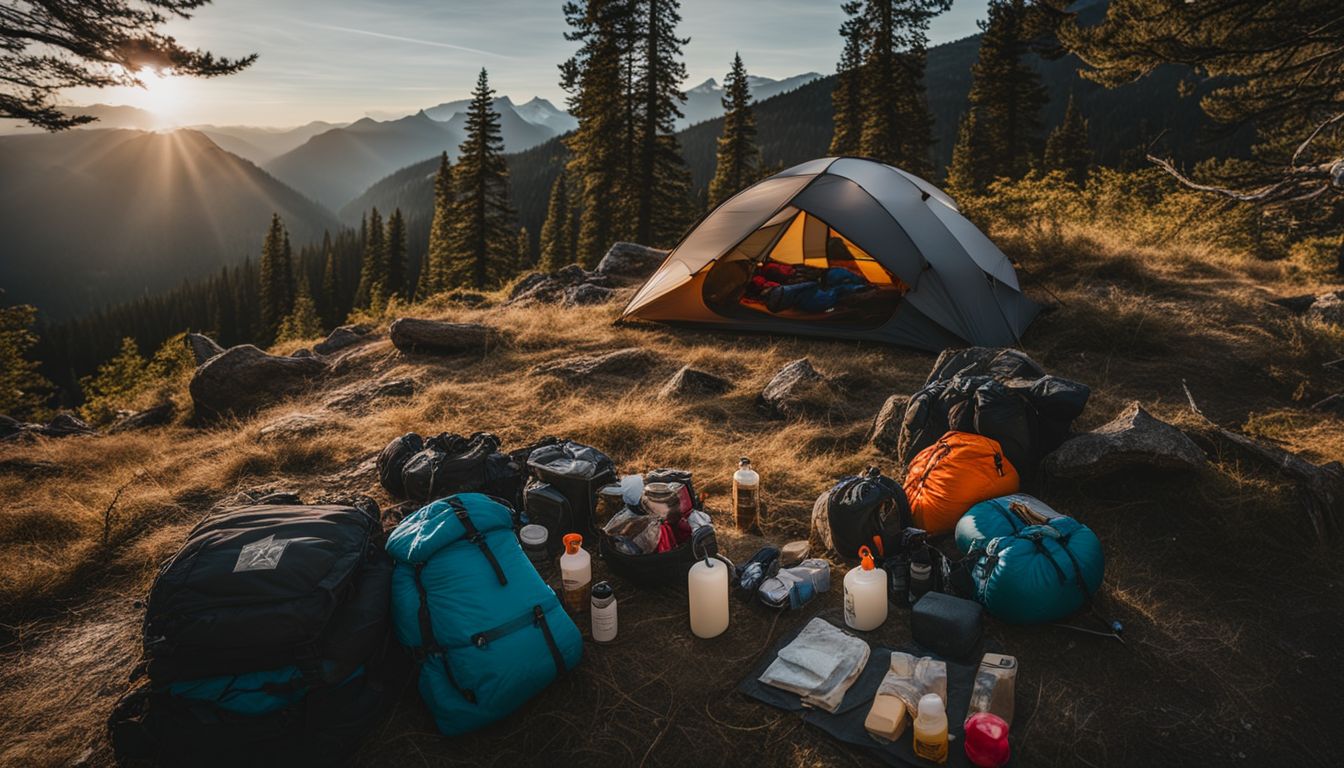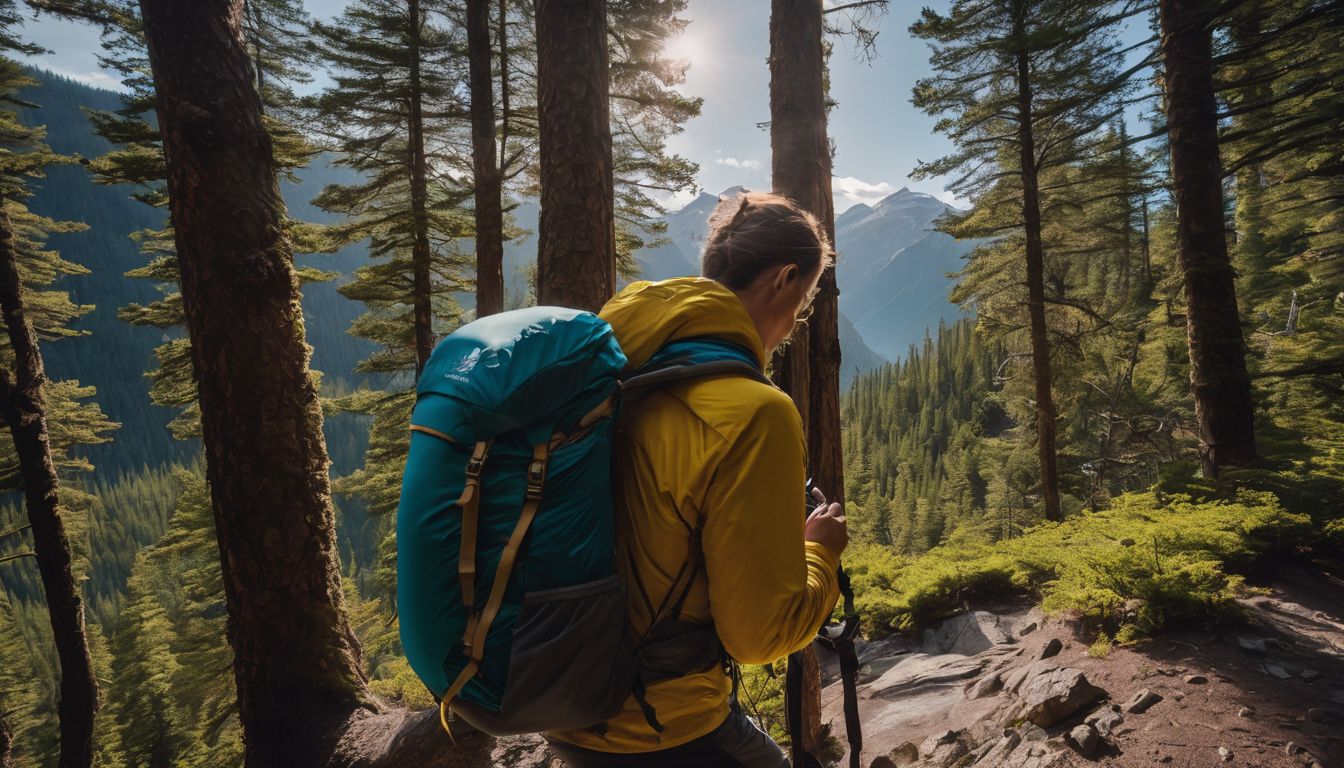Venturing into the backcountry brings a sense of freedom that few other experiences can match, but it also comes with responsibilities — not least among them is the need for diligent rucksack hygiene.
As seasoned hikers know all too well, an unclean pack can become a breeding ground for bacteria, leading to odors and potential health risks. With years of trekking through landscapes as diverse as Grand Teton and Yellowstone National Parks under my belt, I’m here to guide you on maintaining cleanliness on your adventures.
An often-overlooked fact: trail hygiene extends beyond personal comfort; it’s critical in preserving delicate ecosystems by preventing contamination and disease transmission. This blog digs into pragmatic techniques and essential items that enhance backcountry cleanliness without adding unnecessary weight to your load.
Stay tuned for actionable advice designed to keep both you and nature fresh—one clean step at a time. Let’s dive in!
Key Takeaways
- Maintaining rucksack hygiene is essential for personal comfort and to prevent the spread of bacteria and illness while preserving the natural environment.
- Essential items for rucksack hygiene include hand sanitizer, biodegradable soap, wet wipes, feminine hygiene products, toothbrush and toothpaste, and a pack towel.
- Proper hand washing techniques, cleaning up after using the bathroom with biodegradable products, showering in the wilderness when feasible, and caring for clothing and gear are crucial aspects of backcountry cleanliness.
- Consistently practicing good trail hygiene not only enhances your well – being but also minimizes the risk of illnesses and infections during outdoor adventures.
The Importance of Rucksack Hygiene in the Backcountry

Maintaining personal hygiene, preventing the spread of bacteria and illness, and preserving the environment are all crucial reasons for prioritizing rucksack hygiene in the backcountry.
Maintaining personal hygiene
Keeping yourself clean while out with your rucksack is a must. You should pack enough clean clothes and take care of them. This stops bad smells and health problems like jock itch.
Dry, neat clothing helps keep you comfy and safe from sickness.
Washing your hands well is part of taking care of yourself too. Many hikers use hand sanitizer to save water. It’s also smart to have things like biodegradable soap, wet wipes, menstrual products, toothbrushes and paste, and a towel for drying off in your pack.
Taking steps to stay fresh makes the journey better for you and keeps the places you visit beautiful for others too!
Preventing the spread of bacteria and illness
Clean hands are a key way to stop germs from spreading. Use alcohol-based hand sanitizer when you can’t wash your hands with soap and water. Sanitizer is good for killing bacteria, but it doesn’t get rid of dirt.
So scrubbing with soap and water is best when possible.
Keep clean after going to the bathroom, too. Always pack out used toilet paper using sealable bags. This helps keep the trails and campsites clean for everyone.
Next up are some items that help you stay hygienic while exploring the backcountry.
Preserving the environment
Taking care of the backcountry means keeping nature as you found it. Use biodegradable soap and stay away from lakes and streams when washing yourself or your clothes. Dirt and suds should always be 200 feet away from water sources to protect fish and plants.
If everyone cleans up their waste properly, we can enjoy clean trails for a long time.
Imagine walking through the woods and breathing fresh air without any foul smells. That’s what happens when backpackers pack out all their trash, including moist towelettes and menstrual products like tampons or pads.
Following Leave No Trace principles is not just kind; it’s necessary for our planet’s health.
Next, let’s talk about essential items you need to keep your rucksack hygiene top-notch!
Essential Items for Rucksack Hygiene

Include hand sanitizer, biodegradable soap, wet wipes, feminine hygiene products, toothbrush and toothpaste, and a pack towel in your backpack to ensure you’re equipped for maintaining personal hygiene while on the go.
Hand sanitizer
Keep your rucksack clean and germ-free by packing hand sanitizer. It’s a must-have for maintaining personal hygiene in the backcountry. Even though soap and water are more effective, alcohol-based hand sanitizers like Purell offer great coverage against most pathogens and don’t encourage resistance development.
However, be cautious when using hand sanitizers with food flavors or fragrances as they can pose health risks if ingested.
Furthermore, due to their convenience, you can take them anywhere without needing water or towels. Despite the benefits, it is essential to be aware of potential risks associated with certain types of hand sanitizers to ensure safe usage during your outdoor adventures.
Biodegradable soap
Transitioning from the importance of hand sanitizer to maintaining rucksack hygiene, let’s talk about biodegradable soap. When venturing into the backcountry, it’s crucial to choose a soap that is gentle on nature while keeping you clean.
Biodegradable soap fits the bill perfectly. Made without toxins and artificial scents, this type of soap breaks down at least 90% into water, carbon dioxide, and natural materials.
Using biodegradable soap helps minimize environmental impact when washing up in the wilderness. However, it’s essential to remember that even biodegradable soaps can affect fresh water sources and aquatic life if not used responsibly.
Wet wipes
After using biodegradable soap, it’s crucial to keep your rucksack clean and odor-free with wet wipes. Scent-free baby wipes are an excellent choice for maintaining personal hygiene during outdoor adventures, especially when access to showers is limited.
Wet wipes are particularly beneficial for women’s hygiene in the outdoors, providing a quick and effective way to freshen up while minimizing environmental impact. When used regularly, wet wipes can help you stay clean and comfortable throughout your trek or camping trip.
Wet wipes serve as essential items for rucksack hygiene, ensuring cleanliness and freshness while on the go. Incorporating them into your packing list can significantly contribute to a more pleasant and hygienic outdoor experience.
Feminine hygiene products
When it comes to maintaining feminine hygiene in the backcountry, it’s important to choose products that are suitable for the environment and your personal needs. Opt for menstrual cups or biodegradable tampons and pads to minimize waste.
Breathable fabrics in these products can help prevent bacterial buildup, reducing the risk of vaginal infections. Additionally, using unscented toilet paper and liners is recommended to avoid skin irritation and maintain natural pH balance.
Keeping these considerations in mind ensures that you stay comfortable and healthy while minimizing your environmental impact.
Using appropriate feminine hygiene products is essential for staying clean and comfortable during outdoor adventures. Menstrual cups or biodegradable tampons and pads are not only beneficial for the environment but also contribute to your personal comfort by preventing the buildup of bacteria.
Toothbrush and toothpaste
When it comes to maintaining rucksack hygiene, toothbrush and toothpaste are essential items for keeping your oral hygiene in check. Keeping your teeth clean is crucial not only for preventing tooth decay but also for maintaining overall health.
A travel-sized toothbrush and toothpaste are compact and lightweight, making them easy to pack in your backpack for any outdoor adventure. It’s important to use these items regularly to prevent bacteria from proliferating in your mouth.
Toothpaste has been used since ancient times to whiten teeth, freshen breath, and clean teeth and gums – a practice that still holds true today. Encouraging students or fellow trekkers to carry a travel-sized toothbrush and toothpaste can help maintain good oral hygiene even while on the go.
Pack towel
To maintain proper hygiene in the backcountry, a quick-dry microfiber pack towel is an essential item to have in your backpack. This compact and lightweight towel is versatile, making it easy to carry and use for various cleaning tasks during your outdoor adventures.
Whether you need to wash up away from water sources or clean your clothing, this absorbent towel performs toweling tasks with ease. Along with other toiletry items, such as hand sanitizer and biodegradable soap, the pack towel helps ensure that you stay clean and odor-free while trekking through the wilderness.
Remember to keep this handy tool accessible when embarking on backcountry hikes and camping trips. Its functionality plays a vital role in maintaining personal hygiene and preserving the natural environment while enjoying outdoor activities like hiking in Grand Teton National Park.
Tips for Staying Clean in the Backcountry
Practice proper hand washing techniques and maintain cleanliness in the backcountry to stay healthy and comfortable during your outdoor adventures. Keep reading for essential tips on rucksack hygiene!
Proper hand washing techniques
Proper hand washing with soap and water is crucial in the backcountry to prevent illness.
- Wet your hands with clean, running water, if available, and apply biodegradable soap.
- Rub your hands together vigorously, ensuring the suds cover all surfaces, including the backs of your hands, between your fingers, and under your nails for at least 20 seconds.
- Rinse your hands thoroughly under clean, running water.
- Dry your hands using a clean towel or air dry them.
Cleaning up after using the bathroom
After mastering proper hand washing techniques, it’s crucial to also maintain cleanliness when using the bathroom in the backcountry. Here are essential steps for ensuring hygienic practices:
- Use biodegradable toilet paper to clean up after yourself.
- Properly dispose of used toilet paper by either burying it or packing it out in a sealable plastic bag.
- Ensure that your campsite is at least 200 feet away from water sources and trails before using the bathroom.
- If you’re a woman, consider using a pee funnel or other feminine hygiene products for convenient and hygienic bathroom experiences.
- After urinating, use a small amount of biodegradable soap and water to clean your hands thoroughly.
Showering in the wilderness
When you’re out in the wilderness, staying clean is important for your health and comfort. While a regular shower may not be feasible, there are ways to freshen up. Wilderness wash or makeshift showers can help you stay clean even in remote areas.
A sponge bath is also a practical alternative when a full wash isn’t possible due to weather conditions or limited resources.
Remember that keeping clean in the backcountry helps prevent infections and discomfort. Embracing these methods will ensure you feel fresh and rejuvenated during your outdoor adventures.
Taking care of your clothing and gear
After showering in the wilderness, it’s crucial to ensure your clothing and gear are well taken care of. Here’s a detailed guide on how to maintain cleanliness and hygiene for your attire and equipment:
- Agitate dirty clothing to help remove dirt and odor before washing, ensuring it is done well away from natural water sources.
- Keep separate bags for dirty and clean clothing to avoid cross – contamination or unpleasant odors.
- Use biodegradable soap and cold water to wash your clothes gently, especially moisture-wicking fabrics to maintain their performance.
- Hang wet or damp clothing to dry completely before packing them back into your rucksack to prevent mold and mildew growth.
- Regularly inspect gear like sleeping bags for signs of dampness or odor, taking necessary measures to keep them fresh and clean.
Proper Disposal and Pack Out Methods
Dispose of waste properly to protect the environment and maintain cleanliness. Pack out all trash and follow Leave No Trace principles to minimize impact on natural surroundings.
Dealing with waste
Proper waste management is crucial for maintaining hygiene in the backcountry. Here are detailed steps for dealing with waste:
- Use double bagged systems with chemicals to reduce odors when disposing of human waste.
- Pack out human waste, toilet paper, diapers, and hygiene products.
- Repackage solid foods and liquids into reusable containers to minimize trash volume and weight.
- Implement methods to reduce waste such as reusing containers, reducing packaging, and conserving water and energy.
- Ensure that all waste is properly disposed of according to wilderness regulations.
- Utilize products free of toxic materials and aim for in – process waste reduction.
Keeping a clean sleep area
To keep a clean sleep area while camping, it’s important to maintain personal hygiene and follow good practices. Make sure you wash your feet, change into clean socks, and avoid soiling the inside of your sleeping bag by wearing clean clothes.
Cleaning dishes properly also helps prevent odors in your sleeping space. Additionally, using biodegradable soap and wet wipes can help you stay fresh and odor-free during your outdoor adventures.
Ensure that when camping or hiking, foot care is prioritized as athlete’s foot can be a common issue due to lack of proper hygiene. Keeping panty liners handy for feminine hygiene needs can also contribute to maintaining a cleaner sleep area while out in the backcountry.
Maintaining a fresh smelling pack
After ensuring a clean sleep area, it’s essential to maintain a fresh-smelling pack for your comfort and hygiene. To achieve this, regularly air out your pack and gear to prevent odors from lingering.
Additionally, using odor-eliminating sprays designed for outdoor gear can help keep your pack smelling fresh throughout your treks. Packing scented dryer sheets or pouches of baking soda in different compartments of the rucksack can also help absorb any unwanted odors that may develop during your trips.
By incorporating these simple practices into your routine, you can ensure that your pack remains pleasant-smelling and ready for all your outdoor adventures.
Pack it in, pack it out mentality.
After maintaining a fresh smelling pack, it’s crucial to embrace the “pack it in, pack it out” mentality. When venturing into the backcountry, always carry a waste management bag for disposing of bodily waste.
Adhering to Leave No Trace Principles is essential; pack out all trash, leftover food, and litter. Remember to use cat holes for solid human waste disposal and minimize environmental impact by packing out used toilet paper.
Maintain an organized and efficient travel mindset by employing minimalist packing techniques.
Conclusion
In conclusion, maintaining rucksack hygiene is crucial for a successful and enjoyable outdoor experience. By following the essential tips and carrying the necessary items, hikers can ensure their personal cleanliness as well as contribute to environmental preservation.
Have you thought about how these simple practices can make your backcountry adventure more comfortable? Implementing these strategies will not only enhance your well-being but also minimize the risk of illnesses and infections.
Imagine the impact of consistently practicing good trail hygiene on your overall outdoor enjoyment! Explore additional resources to deepen your understanding and commitment to rucksack hygiene, leading to a more fulfilling journey into the wilderness.
FAQs
1. How do I keep my rucksack from smelling bad?
To keep your rucksack clean and free from odors, make sure to air it out after use, wash it regularly with a gentle washer, and store your dirty camp shoes separately.
2. What can I do to prevent foot problems like athlete’s foot on the trail?
Always dry your feet well, change into clean cotton bandanas or socks often, and let your feet breathe by wearing camp shoes when you’re not hiking.
3. Can carrying a water bottle help with dental hygiene during hikes?
Yes! Drinking water throughout the day helps wash away food bits that can cause bad breath, and you can also rinse your mouth with water to stay fresh.
4. How do I avoid UTI infections while backpacking?
Stay clean by using items like a kula cloth for peeing instead of toilet paper, wash hands frequently, drink plenty of water from a clean water bottle to flush out bacteria.

